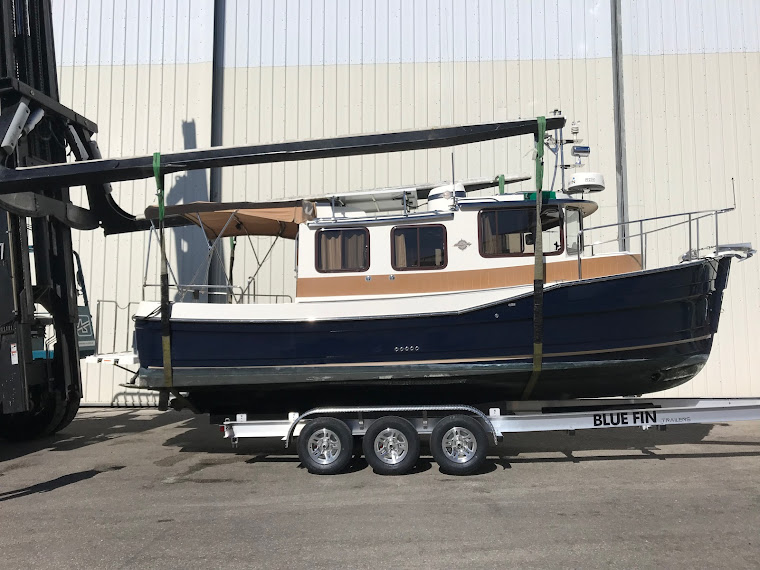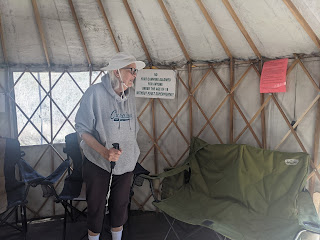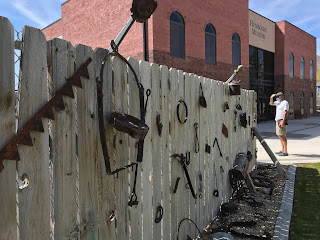A
Couple more days in Nevada
Our stop in Topaz Lake – the lodge and casino RV park – was just across the California line into Nevada. We lingered a couple days to take some drives and walks through the Carson Valley before heading to Davis Creek Regional Park.
This park is a few miles north of Carson City on 395 but feels like a mountain
retreat. It is tucked up next to the mountains which shelter the Incline
Village Ski resort on Lake Tahoe. The
trail to the Tahoe rim from the park is about 8 miles straight up 😊 so we took Highway 50 – by car. We spent
a day driving around the lake with stops for short walks and lunch then ending
the day with dinner at Robin and Seth’s lake house. They have established a
base in South Lake Tahoe since they have enjoyed multiple business contracts in
the area. Tough duty – working on the
lake – but then when it snows, it can be less fun since their projects involve
diving in the water. Sorry no photos of the dinner crowd (just Robin cooking!) which
included Robin’s parents and some of their siblings.
We
also wandered about the historic downtown of Carson City while in the area – a
small town with easy access to both Lake Tahoe and the desert. We also learned
about Mark Twain’s connection to the area and wandered by his brother’s house where he reputedly stayed while in
town.
Our
trip up to Virginia City was a foray into tourist land even during Covid. The drive up through Silver City was
spectacular – Steve was impressed with the 16% grade – glad we did not drag the
trailer up there. The town is one tourist venue after another. Some of the best
museums were still closed – more for the season than for COVID. Folks were
wandering the streets, however, and fortunately masking when entering stores.
There is an atmosphere of the gold rush era but not as powerful as the ruins in
Bodie. There is just a lot of kitsch to distract from the history.
We
did walk around the Bowers Mansion a short distance from Davis Park. This lovely building was built with gold
money and became a place of local social gatherings before the gold ran
out. Then in the early 20th
century, it was purchased and restored to once again become a community
treasure. It now hosts public events
like concerts on the porch and house tours in the warmer months.
From Carson City we headed east to spend a few days at Fort Churchill State Park on the Carson River. The fort ruins have been stabilized and are connected by a nice walking path. This fort was built to protect the gold rush towns whose arrival created conflicts with the indigenous peoples. However, at the campground we were attacked by gnats every step out of the trailer unless the wind was blowing briskly, i.e. howling. We took a road trip down to Yerington, NV to escape the bugs. Found a nice antique store but no barber shop and our new favorite grocery store, Raleys.
 |
| Historic Buckland Station - sadly not open yet |
 |
| Crazy House on the Road to Yerington |
 |
| signs marking this route to California which passed Fort Churchill |
Giving up a day early we
were lucky that Glenn and Carolyn found room for us at the Alpaca Farm –
Sawdust Alpacas. They are Harvest Hosts – a wonderful organization that
connects businesses with RV travelers. We enjoyed observing and learning about
the alpacas almost as much as I enjoyed shopping in Carolyn’s shop for alpaca
yarn. It is not often one can buy yarn
and see the animal it came from outside one’s window!
From the alpacas we moved to Lattin Farm another Harvest Host not far away. We were able to set up early in the day and visit the local museum in Fallon. This rather small town in kind of nowhere land, has a fabulous museum – well organized and cleverly displayed. It was also empty so we lingered and learned about the ancient peoples that lived in this area thousands of years ago as well as the early history of the town in charming vignettes of shops and rooms. We almost skipped the annex but fortunately we took a peek and found classic cars, buggies, and trucks both restored and crusty.
After a tasty lunch at the Slanted Porch – a local
restaurant recommended by the museum hostess, we headed out to Grimes Point to
see the petroglyphs and hike up to the overlook. The view from the top was mostly of the local
Naval Air Station – which also entertained us with some aerial acrobatics which
seemed appropriate since it is the naval top gun school. A fact that is hard to
miss in this town with many businesses named “Top Gun” this or that.
The
petroglyphs were more down to earth and well worth the walk. Not much is known
about exactly why these pictures were made but some speculate the rocks were
hiding places for hunters waiting to pounce. Perhaps the hunters were just
bored while they waited or more likely they hoped to conjure some prey with
their artwork? While the area is dry these days, wandering the hills and
squinting a little, it is not too hard to reimagine the lakes that once covered
much of the landscape.
From
the Fallon area we continued east to another former lakebed in the Humboldt
River watershed. It is perhaps also important to mention that we have been in
the area of the historic western migration to California. Fallon is on the
western end of the “40-mile desert” that bridges the Humboldt River system and
the Carson River. This desert – more like 20 miles across – was a major
obstacle for the early settlers heading west. Although we buzzed through this
barren stretch it was easy to see why those early travelers made the trip at
night. The powder fine dust must also have trapped more than a few wagon
wheels. We were glad to make the crossing without incident. 😊 Fallon also was a stop on the famed Pony
Express route along Hwy 50, and next trip we will have to visit some of the
stations that are preserved along Hwy 50.
Up
in the Humboldt Recreation Area we camped with one other family along the Army
Drain which sounds much worse than it is. The remnants of the once enormous
Humboldt Lake provide valuable wetlands for migrating birds. Although we might
have been a little early in the season, we did catch a glimpse of flocks of
White-Faced Ibis and a group of four black caped night herons. Most of ducks
were too shy for a clear peek since they took flight before we could get close.
Even turning on our water pumped frightened the coots in the canal.
We
also took a drive in a big round about loop from our camp site to the Lovelock
Cave – a short distance by crow but nearly 20 miles by car. The drive included
a tour of the nearby farms which are currently benefiting from the water not
reaching the former lake. The cave was interesting – even for one who is not
fond of caves. This was the first cave professionally excavated in the Great
Basin back in 1911. They found that
ancient peoples had used it as a storage shed – burying supplies and food. More
than 20,000 artifacts were recovered and we had seen a small sample in the
Fallon museum. The short hike at the cave also highlighted native plants that
have traditionally been used by indigenous peoples. The excellent brochure was
beautifully illustrated and packed with stories from traditional cultures as
well as information. For a rather remote and obscure location, we were
impressed with the quality of the overall experience. In addition, we lucked into a couple hours
totally on our own. We had passed a couple cars on our way in and then again as
we left, but for our time there we could imagine the area as it must have been
for in the distant past.
In
contrast to the austere cave experience, we ventured into the town of Lovelock
– the county seat. As the name might imply the town has become famous for
“locks” left here. There is a lovelock plaza next to the court house that is
cloaked with locks and a cute sign which also has its share of locks presumably
attached to secure eternal love? That was about all we could find of interest
in this small Nevada town besides a well-stocked Safeway to replenish our frig.
Expecting
to catch a late spring storm, on our way to Water Canyon – BLM (Bureau of Land
Management) near Winnemucca, we stopped to refill our propane tank just as some
icy crystals began to fall. Happily, they melted rather quickly but most of day
remained grey and COOL. For the first time in a long time, we actually ran the
heater overnight to prevent our systems from freezing – temps got much too low
for our thin blood. Hoping for the promised warming we planned several hikes,
but woke to more snow – more traditional flakes and fortunately all melted by
noon. The bonus to all the moisture is a greener landscape than we have seen in
quite a while. The solar is keeping up
so all is good.
 |
| View of trailer from hill - cellphone reception sort of |
Water
Canyon is a premier recreation destination just five miles from Winnemucca, NV
although it feels very remote – a feeling bolstered by the lack of a cell
signal. We did find that hiking up the
hill nearby we could at least receive emails. Besides the occasional hike for
email, we wandered up the canyon trail to the yurt – an Eagle Scout project
that is available during the winter season to shelter those who snowshoe up the
trail. It sure provided a snug place to rest before our return – fully equipped
and stocked with everything but food.
A
couple nights in an RV park in Winnemucca rounded out our Nevada stay. While
there we visited the Humboldt County Museum which also displayed some of the
artifacts from the Lovelock Cave as well as several buildings from the late 1800s.
Again, the display of old automobiles caught our attention both those restored
inside and those rusting outside.
We also treated ourselves to a Basque Style
meal at the Martin Hotel. Family style
dining meant we enjoyed dinner with three California older gentlemen up for
some “shooting”. They entertained us with stories of old Bakersfield and the
oil industry there. So, besides doing chores like laundry, grocery shopping and
truck washing, we took a drive out to Paradise Valley a short 40-mile scenic
drive from Winnemucca where our dinner companions were staying. It is mostly a
ghost town but greener than down in the big town. One run of old buildings
claims to be the first strip mall in Nevada. Apparently, these structures were
still in use until the 1950s. I guess the only good thing is they have left the
old buildings for wanders like us to enjoy. Next stop is Eastern Oregon.




































































